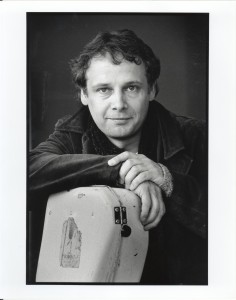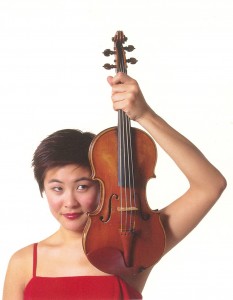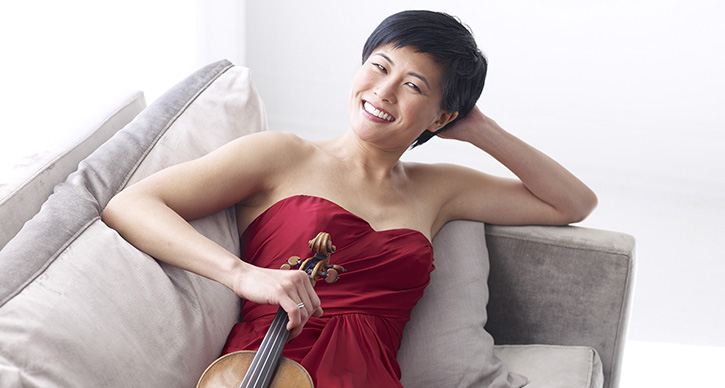Jennifer Koh performs 2/6
Ken Fischer tells us about Jennifer Koh’s upcoming performance in Ann Arbor. Interested in going to the concert? Get more info: http://bit.ly/1rp7IPd
Artist Interview: Jennifer Koh, violinist
Insightful and passionate violinist Jennifer Koh talks with UMS Lobby contributor and composer Garrett Schumann about creative programming choices, contemporary works, and the power of music.
The virtuoso violinist returns to Ann Arbor (following her 2012 appearance in the Philip Glass and Robert Wilson opera Einstein on the Beach) with the third and final part of her Bach and Beyond series on Friday, February 6, 2015.
Garrett Schumann: Throughout your career you’ve maintained a consistent interest in programming contemporary and often newly-commissioned works alongside standard pieces in the violin repertory. Where did this passion for combining tried-and-true pieces with new pieces come from in your development as a violinist?
Jennifer Koh: I think it was always just curiosity. When you first make your foray into discovering classical music, it’s really new to you. Now, to me, it doesn’t really matter what time period the music comes from, whether it is “new” or “old.” The one thing that has been such a great pleasure about working with contemporary music is that I can actually get to meet and work with living composers, and that has been a really wonderful, beautiful part of doing the work.
GS: Do you think that putting older pieces next to contemporary work brings new things out of them?
JK: Everything is in context. We live in a certain age, and every day that passes takes us one day further away from the society of Bach, for example. I actually remember hearing a program by Peter Serkin. This program was a little unusual for him; he was doing all the Bach concerti, and what was fascinating was that everything sounded so modern. I realized that art is about re-discovering.
When I first created the Bach and Beyond program, I bookended the program with Bach because I wanted to create a journey through history and into our contemporary landscape and then return to Bach. You create this circular journey, and you realize that the experience of listening to the things in the middle changes how you hear Bach. And, in a way, it also changes how you frame each of the composers.
I feel that contemporary music links us to the past because it does have this history. Most composers work within the richness of that tradition, but they also add their personal viewpoint to it. The great thing about art, and the great pleasure for me personally as a musician, is that it has the ability to change the world. It creates a situation where people can have a space to be very present, but also go to places that they normally don’t want to go to and access those emotions that they don’t necessarily experience every day.
GS: Speaking of this sort of cyclical nature of Bach and Beyond, what’s really interesting about your performance this season is that when you did your first UMS performance in 2010, you were at the beginning of the Bach and Beyond series. Now that it’s coming to a close, how does that feel?
JK: It’s been an interesting process. I actually remember the very beginning, when it was still very difficult to convince people to do this solo violin program. And I remember when I first came up with the idea, a lot of people said, “Nobody’s going to want to book that.” Nobody does solo violin programs. But now, Bach and Beyond has become much more accepted, so one of the beautiful things for me has been that people have begun to see violin as an instrument that has enough timbre to hold an entire program.
I was also at UMS with Einstein on the Beach, and that experience opened my world in a wonderful way. Those performances were the first preview performances of Einstein, and the first extensive rehearsal process was there. It feels like UMS has been a starting point, and so it’s nice for me to return.
GS: What was the experience of working with director Robert Wilson during Einstein on the Beach like for you?
JK: It was really organic in the sense that it’s always been interesting for me to work with artists that I really admire and respect. When I first met [Robert Wilson], I was intimidated. But then, when I saw how he worked, I felt an immediate connection. I respected his working style because he is a perfectionist, and that’s something that I do myself.
When I got the call for Einstein, I knew immediately that I wanted to be a part of it. But I was actually terrified because I don’t have any acting background. But things that terrify me, I find the most interesting. For example, doing Bach and Beyond when I first thought of it was terrifying as well.
What I hope in the end for any piece, whether it’s Einstein or Bach and Beyond, is that people who actually hear the piece trust you. And that they’ll go along on the journey.
GS: Now that Bach and Beyond is wrapping up, what do you have set up for the future?
JK: My next purely performance-based project is called Bridge to Beethoven. That is really an exploration of all ten Beethoven sonatas, but will also have four new works in conversation with it.
When I first came up with the idea, I had just seen a production of Julius Ceasar by the Royal Shakespeare Company. They had made Julius Ceasar a despotic military junta leader in Africa. Again, that inspired me to think about how changing the setting can really alter our assumptions.
So when I was exploring the Beethoven sonatas, I wanted to approach the assumptions that we have in our current psychology. For a lot of people, Beethoven is the “definition” of classical music. If you say “Beethoven,” people tend to have a very specific perception of the music. The question for me, became, “How has classical music evolved?” If you look at his music, he was quite a revolutionary, but now oftentimes it’s performed such that it doesn’t sound new, it doesn’t sound modern. For me, what was important was to bring out these parts of the music that are not just “elevator music.” To really hear those revolutionary aspects in his compositional process.
What’s also interesting to me and helped to inspire this project is that I come from a non-musical background, but at one point, I discovered music is something that I love. Many American composers also come from non-musical families, so what is it about music that draws us to that platform? I wanted to create that kind of dialogue in a compositional way.
My ethnic roots are also in a country halfway across the world in Asia. How is it that I came across classical music? How is it that this art form has changed my life to the degree that I can’t imagine my life without music? Questions like this are reflected in the project as well.
Anyhow, we’re actually starting it late next season and we start it in California, then we take it to Virginia, and then it will go to New York.
GS: Well, I have to say that as a young idealistic grad student, I really appreciate the consideration you put into the program and the fact that you want to address issues that are larger than the music or parts of the music, these are things that are sometimes missed in the traditional setting.
JK: I agree. There is this idea of reaching outside of what you already know, and it’s becoming less and less common. I think that the arts are great because they are an open experience that’s about empathy, about having an experience that you don’t have on a normal basis.
Interested in learning more? Check out other interviews by Garrett Schumann.
Program Changes for March
I’m writing with some disappointing news related to the three March Chamber Arts Series concerts. We learned that violinist JULIA FISCHER is canceling her two upcoming UMS concerts, both of which were on the Chamber Arts Series. Because of a family concern, she has canceled her entire US tour. We worked hard to find replacement artists for her two concerts and are delighted to announce that we will be presenting two different artists. The programs will vary from the original all-Bach program given the changes in artist, but we’re very pleased that we’ve been able to work with the artists so that the programs will include significant representation of Bach’s compositions for solo string instruments.
On Wednesday, March 24, Dutch cellist Pieter Wispelwey will perform a solo cello concert that includes two suites by J.S. Bach alongside two suites by Benjamin Britten. 
On Thursday, March 25, violinist Jennifer Koh will perform a program that features two of Bach’s partitas, with additional works by Eugène Ysaÿe, Kaija Saariaho, Elliott Carter, and Esa-Pekka Salonen.
Complete details on each program are included below. Because of the programming changes, the Masterpieces Revealed scheduled for March 23 has also been canceled.
We’ve also heard from the manager of the Takács Quartet who contacted us to let us know that the second violinist, Karoly Schranz, must undergo rotator cuff surgery and will be unable to perform on March 15. The ensemble has re-imagined their program to include duets and trios for violin, viola, and cello by Mozart, Kodály, and Beethoven. Complete details are included below. Mr. Schranz is expected to make a full recovery and looks forward to returning to the Quartet in the fall, and to UMS for three performances of a Schubert cycle during the 10/11 season.
For all three of these concerts, you may use the tickets you were originally issued. You can also return your tickets for UMS credit (which can be applied to another performance in the 09/10 season), or donate your tickets back to UMS for a tax-deductible contribution. Please contact the UMS Ticket Office at 734-764-2538 for complete details.
This has been an unusually difficult year with cancellations and programmatic changes (the Algerian singer Souad Massi canceled her performance in January, and Trio Mediæval their April concert), and we sincerely apologize if you have been impacted by these changes. Whenever we are able to make a substitution and preserve the original integrity and intent of the originally scheduled performance, we make every effort to do so. We hope that you will approach these changes with an enthusiastic spirit of discovery as we introduce two new artists to UMS audiences and different repertory that we don’t often have the opportunity to hear.
As always, we appreciate your support of UMS and hope that you find much pleasure in the new programs.
Members of the Takács Quartet
Edward Dusinberre violin • Geraldine Walther viola • András Fejér cello
Monday, March 15, 8pm
Rackham Auditorium
Program:
- Mozart: Duo for Violin and Viola No. 2 in B-flat Major, K. 424
- Kodály: Duo for Violin and Cello, Op. 7
- Beethoven: String Trio in G Major, Op. 9, No. 1
Pieter Wispelwey, solo cello
Wednesday, March 24, 8pm
Rackham Auditorium
Program:
- J. S. Bach: Suite No. 1 in G Major, BWV 1007
- Britten: Suite No. 1, Op. 72
- J. S. Bach: Suite No. 2 in d minor BWV 1008
- Britten: Suite No. 3, Op. 87
Jennifer Koh, solo violin (no accompanist)
Thursday, March 25, 8 p.m.
Rackham Auditorium
Program
- J. S. Bach: Partita No. 3 in E Major for Unaccompanied Violin, BWV 1006
- Eugène Ysaÿe: Sonata No. 2 in a minor for Unaccompanied Violin, Op. 27, No. 2, “Obsession”
- Kaija Saariaho: Nocturne, in memory of Witold Lutosławski
- Elliott Carter: Fantasy: Remembering Roger
- Esa-Pekka Salonen: Lachen verlernt [with film projection by Tal Rosner]
- J. S. Bach: Partita No. 2 in d minor for Unaccompanied Violin, BWV 1004



